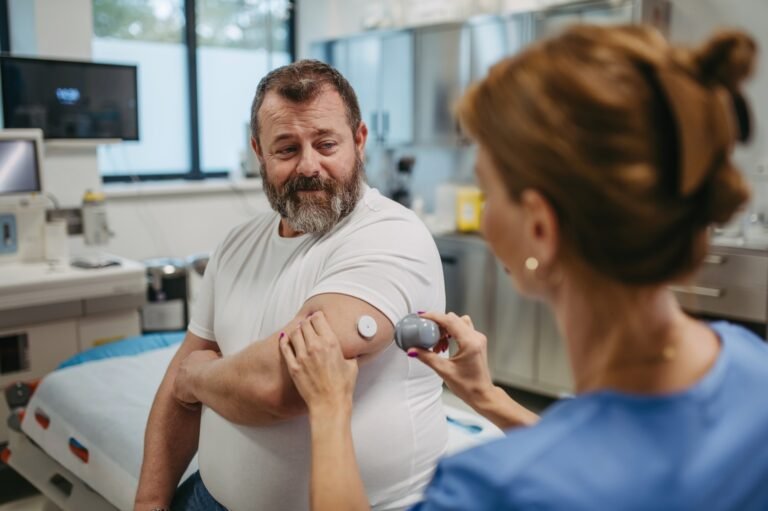In a recent study published in Journal of Epidemiology and Community Healthresearchers investigated gender differences in the rates of microvascular and macrovascular complications among people with diabetes.
Study: Gender differences in the risk of incident microvascular and macrovascular complications: a population-based data linkage study among 25,713 people with diabetes. Image credit: Halfpoint/Shutterstock.com
Record
Diabetes is equally prevalent in women and men worldwide. However, there is conflicting information regarding gender disparities in diabetes-related comorbidities. Diabetes causes multiple microvascular and macrovascular complications, including vision loss, amputation, renal failure, myocardial infarction, and stroke.
Men with diabetes are more likely than women to develop cardiovascular disease. However, there are few data to support gender differences in microvascular complications.
Longer duration of diabetes increases the risk of complications, but there is limited research on the effects of diabetes period on gender differences in diabetes-related complications.
About the study
In the present prospective population-based cohort study, researchers examined gender differences in vascular complications among diabetics. They also looked at whether the duration of diabetes affected the disparities.
The researchers linked the 45 and Up study conducted in Australia to administrative medical information. The study sample included 25,713 diabetics (57% male) aged 45 years and older.
Participants were selected from the Services Australia Medicare database from 2005 to 2009, excluding those with a history of diabetes-related complications or data discrepancies.
The main study endpoints were gender and duration of diabetes at baseline. The team analyzed data provided by participants in baseline questionnaires linked to medical service claims data [Medicare Benefits Schedule (MBS)]hospitalization [Admitted Patient Data Collection (APDC)]drug prescriptions [Pharmaceutical Benefits Scheme (PBS)]and collection of mortality register information (Registry of Births, Deaths and Marriages).
Using hospitalization data and health care claims records, researchers identified new-onset cardiovascular disease (CVD) and lower extremity, kidney, and eye complications.
They used diagnostic codes from the International Classification of Diseases and Related Health Complications (ICD-10-AM) and the Australian Classification of Health Interventions (ACHI).
The investigators generated the adjusted hazard ratios (aHR) for the analysis using multivariable Cox proportional hazards regression modeling. Study variables included socio-demographic aspects, health and lifestyle.
Sociodemographic characteristics measured were age, socioeconomic status (IRSD), income, education level, languages spoken, private medical insurance, and ethnicity.
Body mass index (BMI), physical activity, vegetable and fruit consumption, smoking status, and family history of diabetes were all considered lifestyle and health factors.
Cardiovascular complications included transient ischemic attacks (TIAs), ischemic heart disease, heart failure, stroke, and cardiomyopathy. Eye problems included cataracts and diabetic retinopathy.
Diabetic complications affecting the lower extremity included ulcers, peripheral neuropathy, Charcot foot, cellulitis, peripheral vascular disease, osteomyelitis, and amputations. Renal complications included acute renal failure, chronic kidney disease, dialysis, and kidney transplantation.
Results
The age-adjusted incidence rates per 1,000 person-years for eye, heart, kidney, and lower extremity complications were 52, 37, 32, and 21, respectively.
Men were more likely than women to have cardiovascular problems (aHR, 1.5), lower extremity complications (aHR, 1.5), and kidney problems (aHR, 1.6), as well as eye-related diabetes complications (aHR, 1.1).
Over ten years, 57%, 44%, 35% and 25% of men had retinal, cardiovascular, kidney and lower limb problems, compared with 61%, 31%, 25 % and 18% of women. Duration of diabetes (less than ten years vs. ten years or more) did not significantly influence sex-based differences in diabetes complications.
Males had a higher rate of cardiovascular disease (CVD) complications per 1,000 person-years than females (43 vs. 30).
Both sexes had comparable ocular complications, although men had a lower risk of cataract surgery (aHR, 0.9) but a higher risk of diabetic retinopathy (10 vs. 9 per 1,000 individual years; aHR, 1.1). After ten years, the cumulative incidence of ocular complications was 57% in men and 61% in women.
Men were 1.5 times more likely than women to experience lower extremity complications, as well as osteomyelitis and amputation.
Men had a higher cumulative incidence of lower extremity complications at 10 years (25%) than women (18%). Men had a higher incidence rate of kidney complications than women (36 vs. 26 per 1,000) and their risk was 1.6 times higher (aHR, 1.6).
conclusions
The study reveals that diabetic men are more likely to develop complications such as cardiovascular disease, lower limb and kidney problems and diabetic retinopathy, regardless of how long they have had diabetes.
This highlights the importance of focused efforts to detect and prevent complications. The study shows that every 1,000 individual years, an average of 37, 52, 21 and 32 diabetes patients experience difficulties.
Men are 1.5 times more likely to experience cardiovascular disease, lower extremity and kidney complications, and diabetic retinopathy (14% higher risk). Women with diabetes are more likely to develop cataracts, which can cause eye problems.
Further study, with larger sample sizes and adjustments for confounders such as lipid profiles, glycemic management, blood pressure control, and medications, may increase knowledge of gender differences and underlying processes, allowing for more targeted treatments.
Journal Reference:
Gibson AA, Cox E, Schneuer FJ, et al. (2024) Gender differences in the risk of incident microvascular and macrovascular complications: a population-based data linkage study among 25,713 subjects with diabetes. J Epidemiol Community Health 2024? 0:1–8. doi: 10.1136/jech-2023-221759.
